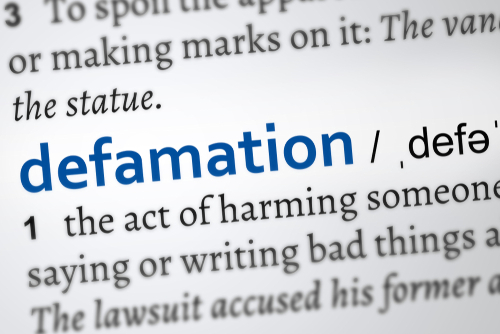Trump's 'big lie' defamation suit against CNN says he shouldn't have to show actual malice by network

Image from Shutterstock.
Former President Donald Trump has filed a defamation lawsuit against CNN alleging that the network has undertaken a “smear campaign” that maligns him “with a barrage of negative associations and innuendos.”
The Oct. 3 suit argues that CNN acted “with real animosity” against Trump, which satisfies the actual-malice standard required for public figures to win defamation suits. But the suit says Trump shouldn’t have to show actual malice by the network.
“Even though the actual-malice standard is met here, in circumstances like these, the judicially created policy of the ‘actual malice’ standard should not apply because ‘ideological homogeneity in the media—or in the channels of information distribution—risks repressing certain ideas from the public consciousness just as surely as if access were restricted by the government,’” the suit says, citing a federal appeals court dissent.
The suit alleges that CNN has broadcast commentary “that he is like a cult leader, a Russian lackey, a dog whistler to white supremacists and a racist. It is the stuff of tabloids cloaked as ‘honored’ news.”
In addition, the suit says, CNN persistently associates Trump with Adolf Hitler, the dictator of Germany from 1933 until his death in 1945, and Nazism.
The suit cites a special report by CNN anchor Fareed Zakaria suggesting that democracy is under attack because Trump questioned the 2020 election results.
The report discussed Hitler’s rise while interspersing footage of Trump, the suit says. Even though Zakaria said in the report he wanted to be clear that Trump wasn’t Hitler, “the disclaimer is lost in an otherwise direct and graphic analogy,” the suit says.
CNN has frequently used the term the “big lie” to describe Trump’s election-integrity concerns, which is a reference to a tactic used by Adolf Hitler and a phrase that he used in Mein Kampf, the suit says. As commonly understood, the idea is that, “If you tell a lie big enough and keep repeating it, people will eventually come to believe it.”
The suit, filed in federal court in the Southern District of Florida, seeks $475 million in punitive damages. It was filed by lawyers Lindsey Halligan of Fort Lauderdale, Florida, and James M. Trusty of Washington, D.C.
Hat tip to Reuters, Law.com, the New York Times and Courthouse News Service, which provided a copy of the lawsuit.
Write a letter to the editor, share a story tip or update, or report an error.



